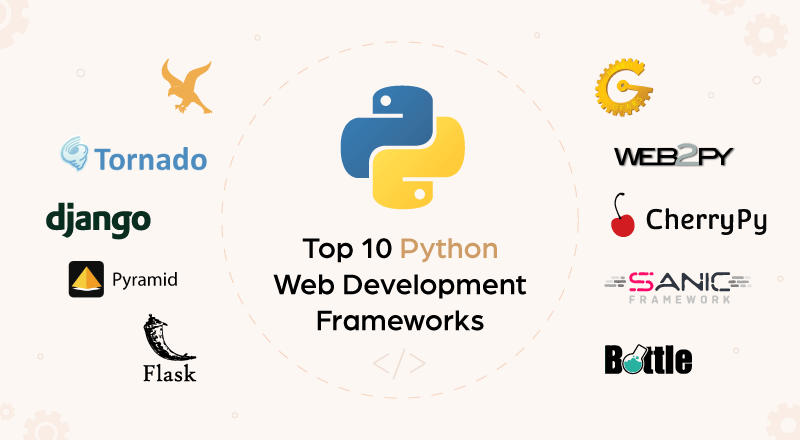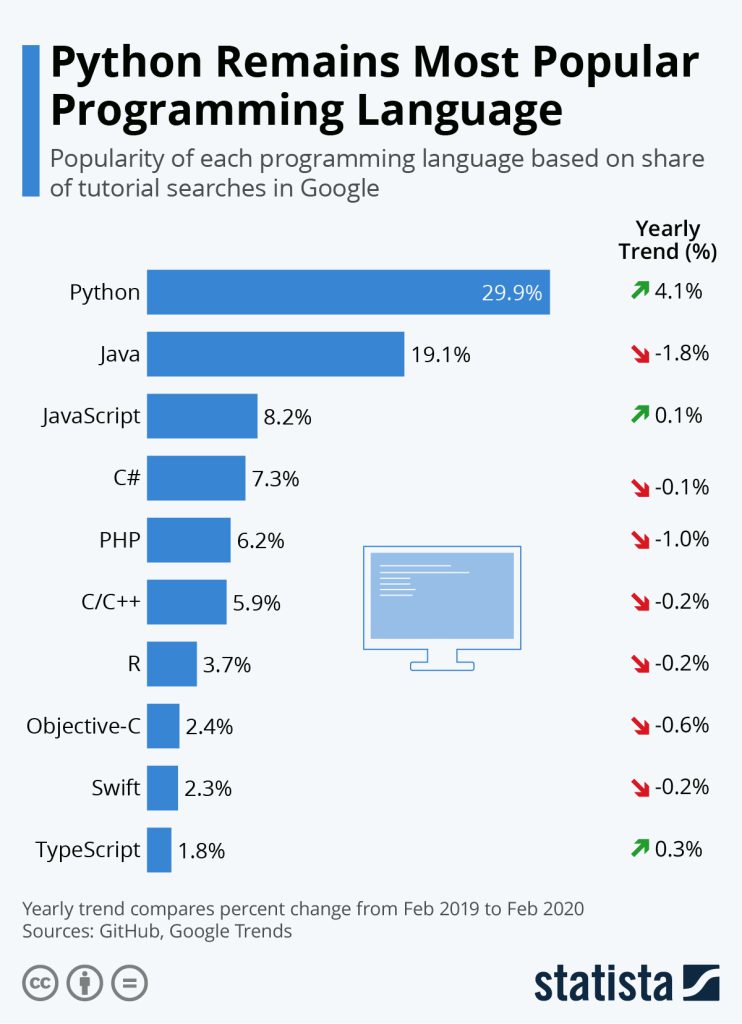


The website is a representation of an idea and an asset to a company. Building it requires a framework that matches its size and complexity. It is essential to know each framework and the set of advantages it brings.
Additionally, selecting the right fit for your project can be a challenging task. But what if a single programming language that is versatile, high-level, tops the chart of popularity, and most importantly, has numerous frameworks that can prove to be a support for web app development?
Today, we will discuss Python frameworks and their role in building websites. But before that, let’s understand the Python programming language and its demand.
Python has been dominating the web app development market for decades, and it is now one of the most sought-after programming languages. There are tens of thousands of developers and beginners who want to learn Python and kickstart their careers in it.
According to the 2019 search results on Google, Python and its related searches, such as “What Is Python Programming Language?”, have outnumbered some of the most popular celebrities searched for on Google.
Even in 2020, it remains at the top of the charts in terms of popularity. GitHub, a software hosting platform, has conducted research that shows around 29% of search tutorials are held by Python.

Python is growing at an exponential rate, and that proves the worth of investing in it. It has beautiful frameworks that provide structure to the ideas of startups, businesses, and brands. Whether it’s a simple and small project or a giant and complex project, this programming language is ready to cater to all requirements.
Additionally, Python is one of the programming languages that enable the development of everything, ranging from web applications to cognitive technology applications, business applications, and software development.
Below are the types of Apps that can be built with the Python Programming Language –
Building these apps and websites requires frameworks that are easy to code and allow developers to focus on the project’s logic by streamlining unnecessary development tasks.
Numerous frameworks are categorized into three different types, which sort them out according to their specific requirements. Recognizing different kinds helps in selecting the appropriate framework for building web applications.
Basically, Python frameworks can be classified into three types:
The full-stack Python frameworks are those that take complete development responsibility, from the client’s end view to data management, and many more aspects.
Also, the full-stack frameworks come with supporting elements that include form generators, form validations, and template layouts. And not only necessary elements, but it is also loaded with tools and packages such as:
These tools and packages serve as a helpful aid for developers. By including them in the software development process, one can rest assured that streamlining routine elements allows for a more focused approach to the project’s logic.
An ideal solution for those who want to work closely on the project, i.e., those who have a habit of manually adding features to enhance the project.
Undoubtedly, micro-frameworks are not compiled with elements, tools, and packages that are built-in advantages for full-stack frameworks. However, what sets micro-frameworks apart is their flexibility in selecting the elements for building software.
Micro-frameworks are lightweight and a perfect fit for apps that don’t require coding. This boosts productivity as well as development time, resulting in the quick launch of the product.
A new and innovative subset of micro-frameworks known to handle simultaneous operations in bulk is called an asynchronous framework. The primary objective is to run multiple threads in parallel, along with the main thread, and also notify the main thread on the completion or failure of the function.
It uses non-blocking sockets and Python’s asyncio libraries to write concurrent code by using async syntax. Additionally, these libraries serve as a source of asynchronous frameworks that offer exceptional performance and networking capabilities.
Now that we know how the frameworks are categorized, let’s understand in-depth the popular Python frameworks:
Django is an open-source, high-level, full-stack Python framework for developing simple to complex web applications. Just like Python, it is versatile, scalable, and flexible. Additionally, it agilely builds software, which is another added advantage.
Moreover, the framework adopts a pragmatic approach and adheres to the DRY (Don’t Repeat Yourself) principle. It is not only limited to theory but has also widened its scope to follow model-view-template architectural patterns.
Apart from this, it is heavily loaded with numerous built-in libraries and can also integrate with third-party libraries. Many big sharks have invested in Django after looking at its outstanding features:
Features Of Django
Many big brands put their trust in Django, and the reason for this trust is its constant support for robust databases, such as MySQL, PostgreSQL, Oracle, and SQLite.
Additionally, what makes Django a star in every developer’s eye is its component reusability, reduced coding, unmatched efficiency, and extensive community support.
Flask is a Python framework that focuses on building robust web apps.
The Flask framework has a built-in server and debugger, which run the application and can process multiple users’ requests simultaneously.
Additionally, being a micro-framework, it lacks database support; however, the developers have already made arrangements for this. The framework includes an SQLAlchemy package that connects the apps to the SQL database using the database URL.
Regarding the support for the Flask app’s production, it relies on the WSGI toolkit and Jinja2 template.
Features Of Flask
Flask offers tough competition to Django, which is what sets it apart from others. This may be one of the reasons why many big brands, such as Airbnb, Netflix, Lyft, and Reddit, are putting their stake in leveraging Flask.
In simple terms, Web2py is a vast array of technologies. It has everything that one wishes to have while developing projects. It is a full-stack, free-to-use, and scalable Python framework.
It can swiftly deploy the website with one click, with built-in IDE support, and can edit and debug the apps whenever required. Not only an IDE, but it can also build hybrid apps and maintain them without external support.
Apart from building and maintaining, it can also robustly perform testing. And the built-in ticketing system is something incredible; it detects and shows errors that occur while developing the app.
Furthermore, it stands first in providing security to the applications from vulnerable attacks as well. And not only security, but also encompasses algorithms such as MD5 or HMAC-SHA-512 hash, which protect the stored sensitive credentials.
Features Of Web2py
CherryPy is a micro-framework, open-source, object-oriented Python framework that follows a minimalistic approach. Upon the approach, it comes with an HTTP/1.1-compliant WSGI multi-threaded web server. Applications built using the CherryPy framework are standalone Python apps that do not require an Apache server to run. It means it can run on all Python OSes, such as Windows, Linux, macOS, etc.
Furthermore, as CherryPy features a multi-threaded server, it allows tech experts to run multiple servers simultaneously. It also comes with tools for caching, encoding, and authorization.
Features Of CherryPy
Unlike other web frameworks, TurboGears is an excellent, data-driven, open-source Python framework that rapidly constructs applications. This framework stands out in its use of components such as WebOb, SQLAlchemy, Repoze, and Genshi.
These components help in rapidly building apps that need database connectivity. Also, the framework is compiled with templating that bolsters object-relational mapping (ORM). It turns out to be one of the leading, flexible, and extensive web frameworks that flawlessly launch web applications.
Features Of TurboGears
Bottle is a small-scale web app framework that is only dependent on Python libraries. Initially, it aimed to build only Web APIs, but gradually, it has stepped into rapidly developing micro applications.
Also, what sets the Bottle application apart from others is that it works on a single source document. Another feature of Bottle is that it ensures the swift working of developers with hardware.
It is embedded with shining functionalities such as templating, directing, utilities, and fewer fundamental abstractions over the WSGI standard.
Features Of the Bottle
A fully-stack and potential web app framework that can be utilized for developing easy, simple, as well as complex software. Pyramid turns out to be one of the most favorite web frameworks for developers.
Its versatility has garnered considerable attention, which has in turn spurred demand for this Python web framework.
Additionally, the transparency and quality building of web applications are another benefit that contributes to the framework’s popularity.
Many large companies, such as Mozilla, Dropbox, and SurveyMonkey, are notable examples of the Pyramid Python web framework.
Features Of the Pyramid
It is an open-source, asynchronous web app framework that efficiently handles numerous operations. It is built on top of uvloop and got its name from one of its key features: processing HTTP responses via asynchronous request handling.
Additionally, it offers hassle-free capabilities and faster speed, and this compatibility is evident when comparing it with Python 3.5’s await/async functions.
Features Of Sanic
A tornado is a classic example of an all-around solution for developing bigger and complex structures, and that too within a short period of time. It has everything necessary for building a website, including database support, HTML Templates, URL Handling, and many more features.
Additionally, it emphasizes non-blocking operations and can manage numerous open connections. It is capable of handling 10K connections at a single point in time. It is an ideal asynchronous solution for high-performance, user-intensive apps.
Features Of a Tornado
Falcon is another micro-framework that swiftly builds web APIs. Additionally, it can build HTTP APIs without loading a large number of dependencies. Another advantage of Falcon is a cleaner design, which bolsters HTTP and REST architecture.
Unlike its contemporaries, Falcon has proven to be a practical framework that efficiently processes numerous requests, leveraging the same hardware. It aims for maximum code coverage and is a perfect match for both medium and large applications. And that turns out to be the first choice for big sharks.
Features of Falcon
Good Read: Python vs Java Comparison – Who Is The Better Of The Best In 2020?
There are numerous Python Frameworks to choose from, and the list is never-ending. These are the top 10 frameworks (best Python web frameworks) with their outstanding features that drive the construction of web apps. And these are categorized into three different types that one should be well aware of.
Choosing from the list of Python frameworks can be a difficult task, but it entirely depends on the requirement and how much time you want to build your project.
Hire Python developers or choose from among the leading Python development companies to get the most out of your projects.
Every framework has its own merits and demerits, uniqueness, personality, and various factors. Take your time, do your research, make comparisons, educate yourself, and then make an informed decision.
SPEC INDIA is your trusted partner for AI-driven software solutions, with proven expertise in digital transformation and innovative technology services. We deliver secure, reliable, and high-quality IT solutions to clients worldwide. As an ISO/IEC 27001:2022 certified company, we follow the highest standards for data security and quality. Our team applies proven project management methods, flexible engagement models, and modern infrastructure to deliver outstanding results. With skilled professionals and years of experience, we turn ideas into impactful solutions that drive business growth.
SPEC House, Parth Complex, Near Swastik Cross Roads, Navarangpura, Ahmedabad 380009, INDIA.

This website uses cookies to ensure you get the best experience on our website. Read Spec India’s Privacy Policy